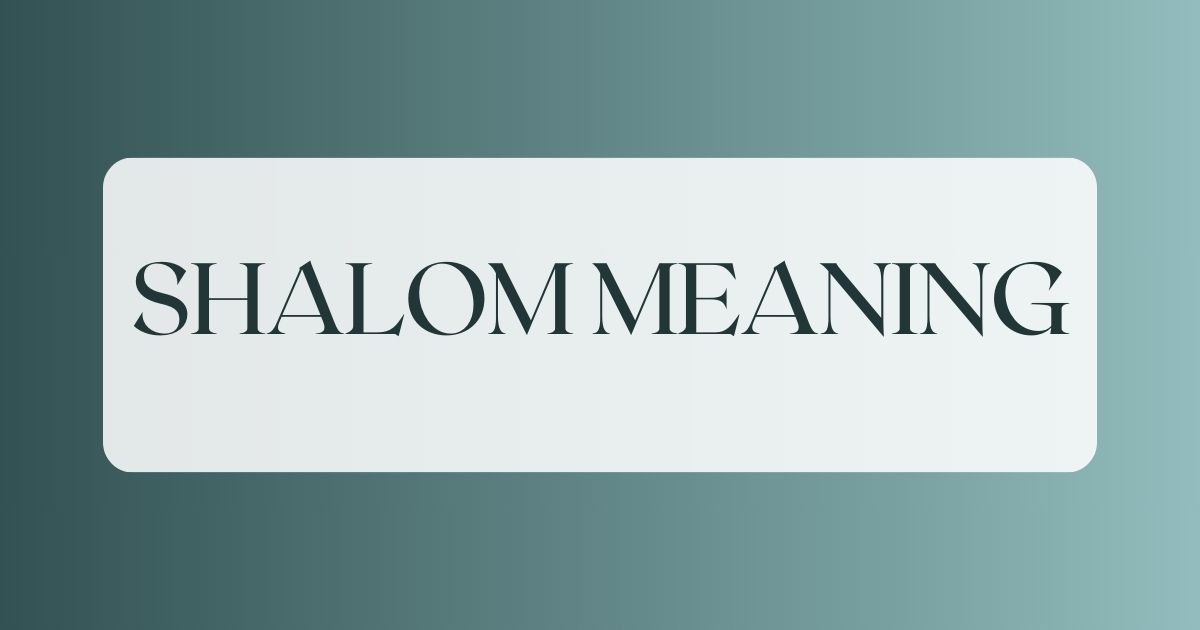Shalom isn’t just a word—it’s an entire world of peace, wellness, and wholeness wrapped in a single Hebrew expression. While many people interpret it simply as “peace,” its significance runs much deeper. This ancient word carries emotional, spiritual, and cultural weight that spans centuries and continents.
Shalom in its original Hebrew context
In the Hebrew language, “Shalom” is derived from the root word sh-l-m, which implies completeness or wholeness. It’s often used both as a greeting and a farewell, suggesting a blessing of peace upon someone whether you’re arriving or leaving. Unlike “peace” in English, which may suggest the absence of conflict, “Shalom” conveys a sense of harmony, balance, and fullness.
Biblical importance of Shalom
The Bible is filled with references to “Shalom.” In the Old Testament, it represents divine peace—something granted by God to His people. One of the most famous verses, Numbers 6:24-26, concludes with: “and give you peace,” meaning “Shalom.” It’s not just about stillness; it’s about restoration and divine favor.
Shalom as a way of life
Shalom isn’t a one-time wish or simple greeting—it’s a lifestyle. Living with Shalom means striving for balance in all areas of life: mind, body, soul, relationships, and even your environment. It’s about choosing compassion over conflict and fostering environments that support mutual respect.
Shalom as a greeting and farewell
In Jewish culture, “Shalom” is commonly used both when meeting someone and when saying goodbye. Saying “Shalom” as a greeting is like offering someone peace at the beginning of your interaction. When you part ways with “Shalom,” you’re sending them off with a blessing. It’s both kind and meaningful.
Shalom in modern Israeli culture
Today in Israel, “Shalom” remains a core part of daily conversation. Whether you’re in a café, on the street, or talking on the phone, chances are you’ll hear it often. Its usage remains rooted in tradition while being seamlessly integrated into modern life.
The spiritual depth of Shalom
Shalom is also a spiritual concept. It’s associated with inner peace, which many believe comes from a connection with the divine. People who seek spiritual growth often aim to experience “Shalom” within, finding calm even in the midst of chaos. This deeper peace becomes a compass in turbulent times.
Shalom and community well-being
In broader social terms, Shalom extends to communities. A community that lives in Shalom supports its members, resolves disputes with fairness, and promotes collective well-being. It’s about justice and equity, not just individual peace.
Shalom in times of conflict
Ironically, the word that means “peace” has often been used in the context of conflict—especially in the Middle East. Political leaders and activists speak of pursuing “Shalom” as a hopeful end to unrest. It’s an aspirational term that carries the dream of coexistence.
Shalom in interfaith dialogues
Shalom also plays a role in interfaith conversations. Whether among Jews, Christians, or Muslims, the concept of peace is central. Using “Shalom” creates a common ground, a word that invites understanding and mutual respect between different beliefs.
The psychological benefits of pursuing Shalom
Seeking Shalom isn’t just spiritual—it has psychological perks too. People who foster inner peace tend to experience lower stress levels, better emotional health, and improved relationships. It’s a holistic form of self-care rooted in ancient wisdom.
How Shalom compares to other cultural words for peace
Many cultures have their own terms for peace—like “Salaam” in Arabic or “Pax” in Latin. While these all carry similar meanings, “Shalom” stands out for its implication of wholeness and balance. It’s not just about stopping conflict but restoring everything to a state of well-being.
Shalom in Jewish prayers and blessings
In Jewish liturgy, Shalom is a recurring theme. Daily prayers, holiday blessings, and even the closing words of many rituals include a request for peace. It reflects how central this concept is to the faith—a continuous longing for inner and communal harmony.
Teaching Shalom to future generations
Instilling the value of Shalom in children is essential for creating a more peaceful future. Parents and educators often use stories, rituals, and examples to help young minds grasp the importance of peace, kindness, and wholeness in everyday actions.
Why the world needs Shalom now more than ever
In a time of social division, political tension, and mental health struggles, the idea of Shalom couldn’t be more relevant. It encourages not just tolerating one another but embracing one another. It inspires both action and reflection.
Shalom as a universal message
Though rooted in Jewish tradition, the message of Shalom transcends religion, race, and geography. It’s a universal longing for something better—for a life where we are whole, healed, and in harmony with ourselves and each other. Shalom is not just a word—it’s a wish, a goal, and a guiding light.
Conclusion
Shalom, meaning “peace,” encompasses spirituality, psychology, community, and relationships. It signifies seeking wholeness, healing, and harmony in a world in need. Saying “Shalom” invokes wisdom and hope.
FAQs
Is “Shalom” used only in Jewish culture?
No, while it’s rooted in Judaism, the concept of Shalom has resonated across other cultures and religious traditions, often embraced in interfaith settings.
Can I use “Shalom” if I’m not Jewish?
Absolutely! Saying “Shalom” respectfully as a greeting or farewell is seen as a gesture of peace and goodwill.
What’s the difference between “Shalom” and “Salaam”?
“Shalom” is Hebrew and “Salaam” is Arabic, both deriving from similar Semitic roots. They share the meaning of peace, though used in different cultural and religious contexts.
How can I live a life filled with Shalom?
Start by cultivating inner peace, practicing kindness, resolving conflicts gently, and supporting community wellness. It’s about balance and intention.
Why is Shalom more than just a greeting?
Because it carries deep spiritual and cultural significance, offering not just hello or goodbye, but a blessing of harmony, healing, and completeness.















